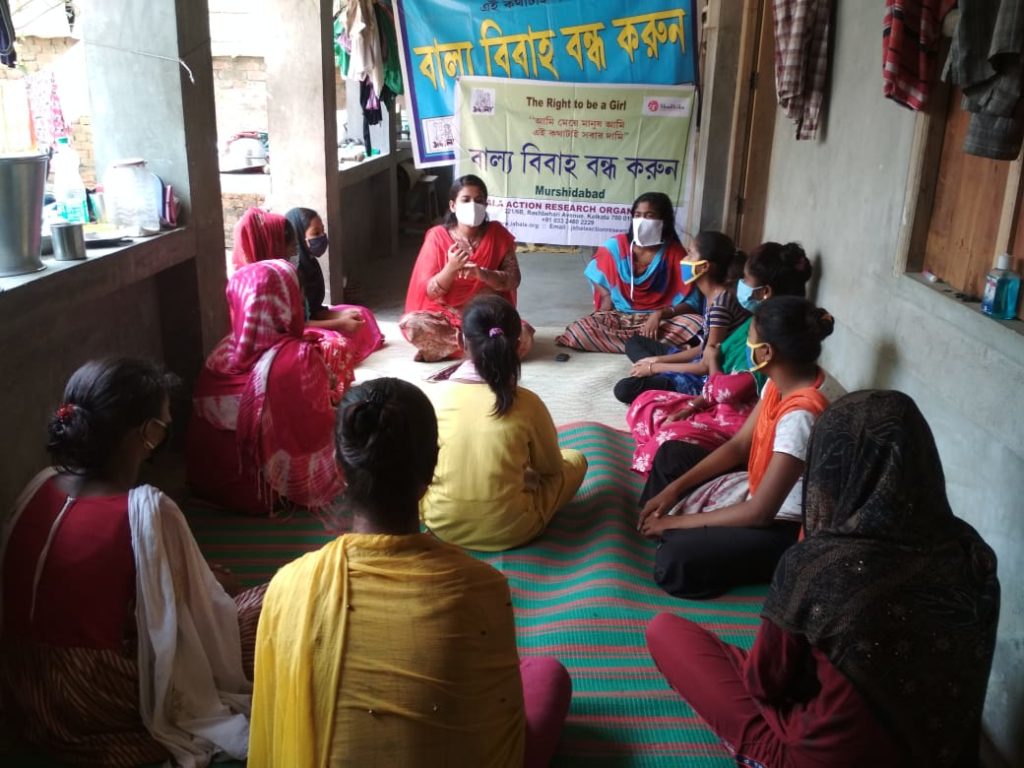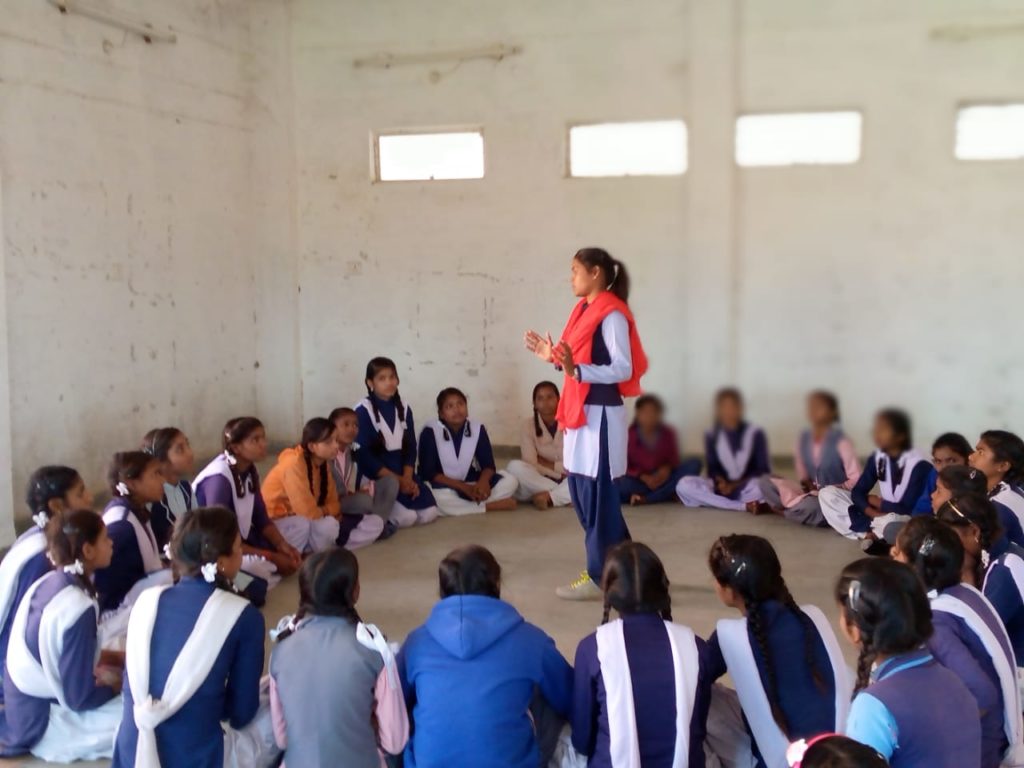
Our scholars aren’t just creating awareness, but making a change and creating spaces where they can speak and other girls have opportunities to speak, to learn and grow together.
From the Field: April 2021
By Sabah Siddiqui, Donor & Program Associate
April 19, 2021
Reading Time: 8 minutesShadhika implemented the Community Leadership Project component of the Scholarship Program in June 2019. All scholars select topics based on their community’s needs. They learn so many things while planning a project, like budgeting, project management and how to have a helpful and enjoyable conversation in person. The main goal of the community leadership project is for the scholar to lead a project, to educate herself on the topic, know it in detail, and to spread awareness to their peers as well as in their community. Throughout this community leadership project, many of our scholars are already leaders and doing awareness campaigns with the partner sites. Through the community leadership project, the scholars get an opportunity to complete their project with their own thoughts and strategies, and they become more confident. These projects create a ripple effect, as they are learning and passing it on to their families, relatives and in their communities. I feel our upcoming scholars are inspired by past and ongoing projects to create their new projects.
2020 was a difficult year because of this pandemic. Everything has changed. We have turned all activities and programs into virtual. Shadhika organized a virtual Leaders for Change Summit 2020 through Zoom and WhatsApp chat, where we trained our second year Shadhika scholars about their community leadership project expectations. We only chose second year scholars for this project because first year scholars need to focus on their new studies and manage their new schedule, and third year scholars are graduating and also need more time to focus on their final exams and job readiness preparations. We have a total of 14 second year scholars, and they all attended the 2020 Summit. They learned all the project procedures in 3 days during the virtual Summit, where they planned their projects, chose their topic based on their community’s needs, made a budget and started working on their project from December, 2020 and all of them completed in March, 2021.
From the time of the Summit in November 2020, the scholars have a four months’ timeline to complete their projects. The Shadhika team stays in touch with scholars during their projects through calls and WhatsApp texts. Most scholars chose either education, technology or health as their project topic. I noticed this year that the scholars chose these topics per our current pandemic situation. They are experiencing COVID-19, and also needed to plan their projects accordingly. All of our second-year scholars started their projects as of January 2021.
Using Technology
Most of the girls are using technology to complete their projects, and I think using technology is a great way to make others aware of their project topics. They were all really excited to begin because everything was new for them. For a few scholars, this was the first-time they had shared a Google Form survey in their communities and with other college girl peers. I was talking to one of our scholars who shared: “This was the first time I created a Google Form, and I love how easy it is to make. It’s really helpful to connect and guide people through my project WhatsApp chat.”
Another scholars mentioned that she was doing case studies in her community with peers. She would choose 4 girls and 1 boy to have a brief phone call conversation with, and during that call she would explaining about her project topic, “Right to Education,” and answer any of their questions. Then she would also do follow up calls. All of our scholars have learned how to connect with people through technology and apps like Zoom, WhatsApp, and Google Meet. A few of them organized virtual workshops, where they have created their own link and shared it with other girls. The scholars learned these new technology skills and didn’t let anything stop them from spreading awareness about their project topics.
Tajdina’s Project: Right to Education
Tajdina is one of our second-year scholars with Jabala, our partner site in Bengal. She chose “Right to Education” as her project topic. She lives in a hostel to complete her studies, as she was far away from her home, she has planned her project in her free time in hostel and when she was back at her home during Holi festival holidays, she organized 2-hour workshop at her centre. She invited 16 girls from her community to a workshop. In her workshop everyone wore masks and followed social distancing. She shared the importance of education with examples so the girls in attendance could easily understand her. She also mentioned government scholarships in her village specifically for girls’ education, and many at her workshop were not aware about this opportunity before.
When she was planning her project, Tajdina shared with me she was really inspired by Shadhika’s International Day of the Girl campaign, and she wanted to plan her project in the same way to create a ripple effect for her awareness. She explained everything to the 16 girls at her workshop and then asked them all to pass this information to family and friends. Last week I had another call with Tajdina, and she was telling me all the girls were happy to be sharing education awareness to other people. She follows up with her workshop participants twice a month about their own awareness and tries to answer their questions.

Poonam’s Project: Mental Health
Poonam is a new Shadhika scholar with Milaan, our partner site in Uttar Pradesh. She chose “Mental Health” as for her community leadership project topic. I was surprised when she chose this topic because very few young women are talking about mental health. It requires confidence and courage to speak with other young women about mental health, and I was so happy while listening to her share the way she was telling her own experience. When I asked Poonam why she selected mental health as her topic, she shared: “In 2020, we have all experienced COVID-19 lockdown for so long and during that time and even after nowadays we are at home. [Many] girls are doing all household chores, instead of being focused on studies. These family pressures are a major issue. Whatever happens in the family–it will directly affect a girl’s mental health. They feel tortured from family about [choosing to] continue their studies or get married, leave studies, and do all the household chores from morning till night.” She is passionate about creating mental health awareness.
She held a workshop at her previous grade school with 25 girls who were 14-16 years old. At the workshop, the participants shared many of their similar experiences, frustrations and struggles. There was also time for the girls to share advice and help each other problem solve. Many girls felt they were not getting enough time to study because of other household chores–and because of that–they felt tense about their studies. Poonam advised them that having a daily routine can really help make their day go better and help them make sure they have the time they need for their studies and other activities that are important to them. All the participants reported they were so happy to attend, and even their principal was happy about this session. Because Poonam was from that school, the principal called her and said she can do more workshops at the school so these girls are empowered like her.

After working with our scholars and listening to their project stories, I have written a short poem:
She was empowered
When she wasn’t aware who was she
She is empowering
With knowing all her talent
If She can create an awareness in herself
So, she can do in her family and in her community
She has selected a route where she is going with younger girls
And that route is about
When she leads, change follows
When I was writing this poem, all the scholars who are doing their community leadership projects were in my mind. They are doing their studies and empowering each woman in their family, community and college. It’s just not about a project they have to do. It’s about a project they are leading by themselves, it’s a project where they are investing their time to learn, research and to adopt new way to communicate with people. It’s a project where they are finding in themselves their talent and passion. They are more responsible and understand how to create a project from start to finish. They aren’t just creating awareness, but making a change and creating spaces where they can speak and other girls have opportunities to speak, to learn and grow together.
Read more